Increased computing power delivers advanced performance for unmanned aerial refuelers.
Boeing has selected BAE Systems to upgrade and modernize the vehicle management system computer (VMSC) for the U.S. Navy’s MQ-25 unmanned aerial refueling system. The technology refresh will increase computing power and address obsolescence issues, providing the unmanned aerial tanker with an integrated solution that improves aircraft performance and allows for future capability growth.
BAE Systems’ next-generation VMSC controls all flight surfaces and performs overall vehicle management duties for the autonomous MQ-25. The MQ-25 is the Navy’s first operational carrier-based unmanned aircraft designed to provide a much-needed aerial refueling capability. It also aims to relieve the refueling mission workload for F/A-18 aircraft, allowing them to take on other key mission roles and increasing the fleet’s capacity.
“BAE Systems is a leader in flight-critical systems and solutions,” said Corin Beck, senior director of Military Aircraft Systems for Controls and Avionics Solutions at BAE Systems. “Our upgraded VMSC for the MQ-25 will deliver advanced functionality—enabling this platform to execute today’s and tomorrow’s critical missions while also reducing the amount of hardware required on the aircraft through consolidation into this computer.”
The cost-effective VMSC upgrade will use quad-core processors to increase computing power while optimizing the aircraft’s size, weight, and power footprint. The multi-core processor selected for the MQ-25 VMSC has recently completed qualification on another U.S. military platform, reducing the program’s cost, schedule, and integration risk.
This highly efficient and integrated system will deliver more capability by replacing multiple other onboard computers, improving aircraft reliability, and reducing the total lifecycle cost of ownership for the Navy. The new VMSC also provides growth capability to support future missions of the MQ-25, such as intelligence, surveillance, and reconnaissance (ISR) technologies, and lays the foundation for all future carrier-based unmanned systems by pioneering the cutting-edge manned-unmanned teaming (MUM-T) operational concept.
BAE Systems also provides the aircraft’s Identification Friend or Foe (IFF) System.

